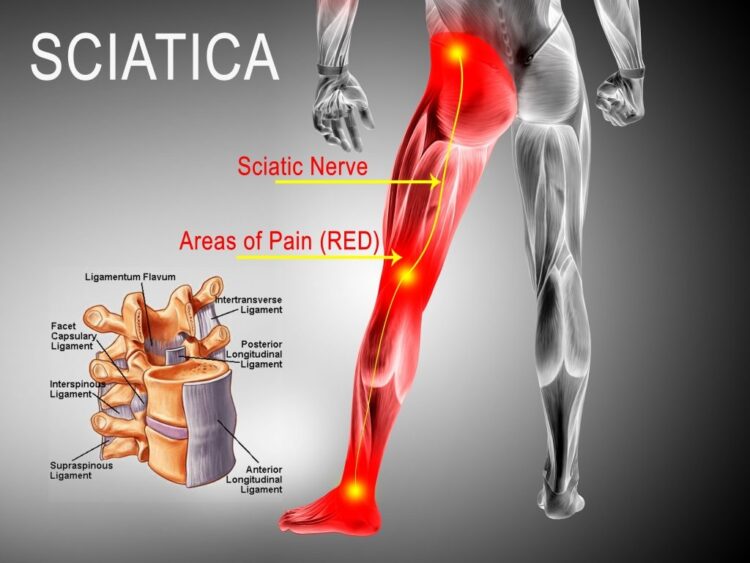Pain is meant to be a signal from your body that something is wrong. It’s meant to be productive, allowing you to detect and fix a problem. When you have a condition in which the only problem is pain itself without a productive end, it makes for a frustrating experience.
Throughout our lifetimes, about 40% of us will have this problem in the form of sciatica: pain from a pinched and inflamed nerve in the lower back called the sciatic nerve. If you’re battling sciatica and you’re considering surgery to treat it, ask yourself these questions first.
What Caused My Sciatica?

The term “sciatica” refers to more of a symptom than a condition: the pain coming from a compressed sciatic nerve. The cause of that compression can be completely different from one person to the next.
One of the most common causes of sciatica is a herniated disc that presses on the sciatic nerve. However, sciatica can also result from bone spurs and tumors growing near this nerve. Spinal stenosis is a potential cause too: a condition in which your spinal canal gets more and more narrow, eventually compressing nerves.
The cause of your sciatica will dictate which treatments may be effective. While most causes for sciatica are treatable with surgery, they would each require different surgical approaches.
If your doctor isn’t sure what is causing your sciatica, the chances are that they can’t make a strong judgment about whether surgery is necessary.
What Else Have I Tried?

Surgery should be a last resort when it comes to sciatica. In fact, only a small percentage of sciatica patients ever choose or need surgery.
It’s important to try other treatments for sciatica first. This can include nerve blockers, medications, pain management injections, or the popular option of physiotherapy like parcofontario.com to relieve the pressure.
Your options will depend on the cause of your sciatica. Regardless, your doctor will most likely try every non-surgical option and only recommend surgery if you don’t see significant results from anything else.

How Is My Sciatica Impacting My Life?
Surgery is a big decision. It has serious risks, and it also requires significant recovery time. For this reason, it needs to make a major difference in your life in order for it to be worth all the downsides.
Sciatica is far more severe in some people than in others. If your pain is mild enough to be a small inconvenience, the chances are that surgery isn’t worth the potential gain.
On the other hand, if your sciatica is so bad that you aren’t able to work or follow through with your other daily functions, surgery is a more viable option. In rare cases, sciatica can make people lose control of their bladder and bowels, and these people typically skip the non-surgical therapies and go straight to surgery.

What Do I Expect to Gain from the Surgery?
For any elective surgery, it’s important that you make your decision with accurate expectations for your results. In the same way that you shouldn’t have a facelift with the assumption that you’ll look 40 years younger, you shouldn’t assume sciatica surgery will leave you pain-free.
While most people who have sciatica surgery will enjoy significant results, there are no guarantees.
You also need to have accurate expectations for the surgical process itself. Make sure you know what you’re signing up for regarding the procedure, the recovery time, and the scarring before you make your decision.

Who is Recommending This Surgery?
As much as we’d like to believe that all doctors are perfectly benevolent and will recommend the procedure that is in our best interests, that isn’t always true. Doctors can engage in just as many sly sales practices as other businesses.
Is your doctor someone who primarily does surgery? What percentage of their past sciatica patients have had surgery? If it’s far more than an average of 5-10%, it should give you pause.
In truth, it’s always worth your time to get a second opinion when it comes to something as serious as back surgery.
Making Your Choice
Sciatica is one of those conditions that impact people in vastly different ways. It ranges from an occasional annoyance to a career-ending, life-changing affliction. The good news is that for most people, there are options besides surgery.
 Hi Boox Popular Magazine 2024
Hi Boox Popular Magazine 2024



